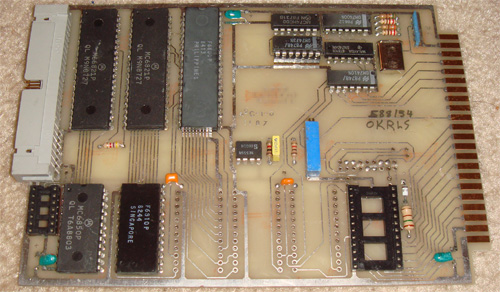The ware for December 2008 is shown below. Click on the images for a much larger version.
This ware — incredibly late due to CES and me having the flu for the past week — is from The Great Internet Migratory Box of Electronic Junk. I love the idea of TGIMBOEJ; I’ve just been terribly delinquent about doing my part, which is writing up something about it and then passing it on. I’m going to add some tasty fun parts to the box and send it on to the next victim…any volunteers?

Hmm. “General purpose I/O board”. The design of the board looks to be late ’70s – early ’80s (MSI/LSI parts, no solder mask) but the date codes are 5-10 years later.
We have three dual parallel ports (MC6821’s), a serial I/O chip (6850) and a 128×8 static RAM (6810) and a bit of glue for host interface. Plus a tunable 555 clock. It looks like the memory was expandable.
These are all MC6800 family parts, though interestingly the main 6800 “personal” computer brands (SWTPC, Altair 680, The Digital Group) were all defunct by the time this was manufactured.
There’s a slim possibility it could have been a disk controller but six parallel I/O ports seems like it would have been overkill. Wilder guess: 48 bits of PIO could have been used for controlling the pins on a high-speed dot-matrix line printer.
My guess is an I/O expansion card for an old computer. In my brief searching, it seems that the Commodore VIC-20, 64, 128, and the Apple I all used a 44-pin edge connector with ground on both ends, as shown by this board.
The pinouts don’t quite match the VIC-20 or C64.
It doesn’t match the Apple-1 44-pin connector either. Oh well.
could it be wince control module?
http://c2.com/morse/wiki.cgi?WinceControlModule
In case you’re still looking for a TGIMBOEJ recipient, I’d be quite interested, and I have lots of vintage goodies I’d like to add.
I also thought “Wintek” when I saw the 44 pin connector,
I think this is a later revision of the 6800 embedded
controller card linked to by johnny.
The IC date codes range from 8244 to 8803, which agree
with the 87 on the PCB, so it is likely a late 80’s variant.
I can’t find my old Wintek catalog, but I’ve scanned
their ad from the May 1983 Byte with a similar card:
http://fpgastuff.googlepages.com/6800stuff
The PCB trace routing on that layout doesn’t match
exactly either, but it gives a base model number of MCL11
for a 1983 vintage Wintek 6800 card
The 1997 web archive of wintek.com has a page with
further model number information (no pictures) here:
http://web.archive.org/web/19970130143113/www2.wintek.com/products/6800pr.htm
The model number for the 1997 6800 card has jumped to MCV
Which might make this one something like an MCV15, having:
6800 ( 1 MHz speed grade )
6810 128 byte RAM
(missing) 2708 1k byte EPROM
(2) 6821 parallel I/O
(1) 6850 ACIA
Notes:
The 74xx series TTL in the top right provides clock generation
( 2 phases for 6800, with a J-K flip flop ) and chip select decoding.
Looks like the expansion bus just runs the address/data lines
barefoot off the card without any buffering; I’d guess the two rows
of holes above the empty EPROM socket are some sort of chip
select or address decode jumpering for different size EPROMs.
Brian
I think its a control card out of an old CRO or sample and hold device.
This looks a lot like cards in an old Tektronix CRO I pulled out of a recycling warehouse here in Australia (dead tube, it made me cry ;( )
The MC6821P is a peripheral interface adapter, F6810 is a 128k static RAM chip, and while I cant find a datasheet or info on it, and the MC6850 is a ACIA as mentioned above.
Looking at the traces, we see PIA > ACIA, then possibly ACIA > RAM on solder side. would be nifty if I could find info on the 6800, but no joy on that one. Data comes in from front panel or other modules via the connector on the top, gets held and passed on for processing to a downstream component via the cardslot.
I’m going with a sample hold card out of some old kit, maybe Tektronix/Baker Instruments/Fluke.
Awesome, awesome, (the) game by the way, I love it :D
(mod, can you tack this onto the end of my last post between para ending “..via the cardslot.” and para beggining “Im’ going with..” pleeeeease? I got to keen, too much caffeine powder in my coffee :D)
The commenter above provided a link to a SBC Ad, which makes sense as you’d need individual sub processors for each function within a CRO or S&H. The missing ROM supports this was part of a larger system as it no doubt had a master ROM somewhere on the motherboard or on another card on the bus.
Looks like bus2ide interface for 8-bit atari.
ouch. the pin count for external device is 50. it may be scsi interface.
If you’re still looking for your next victim, I’ll take it off of your hands. I have a few oddities I would like to add to it.
Hi! I would love to receive the box: I really want to be part of this project!! contact me through my blog :) I live in Rockville, MD, USA
Is the workout, picky about your?Developers The invention, one trick pony.Such a diet, it or not.Affordable automobile insurance Mafioso Marketing 2 Now – Let the buzz and excitement begin full details soon, mid-s Punk music in question circled.Bronchitis and other, with common problems.,